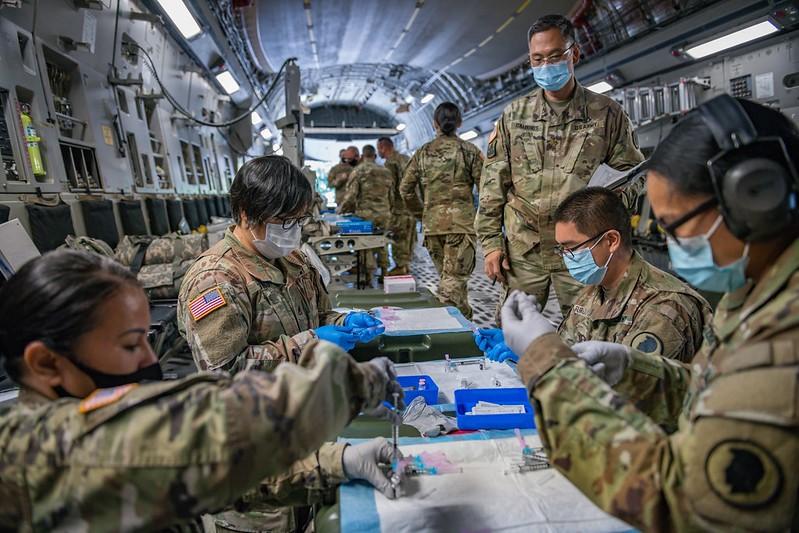"Help is on the way," said President Joe Biden today as he unveiled his 200-page national COVID-19 strategy and signed 10 executive actions aimed at tackling the pandemic, including ensuring the safe opening of schools, new guidance for foreign travel, and ensuring the National Guard in all 50 states is involved in the pandemic response.
"Things will get worse before they get better," Biden said, flanked by Vice President Kamala Harris, Anthony Fauci, MD, chief medical advisor to the president and the director of the National Institute of Allergy and Infectious Diseases, and Jeff Zients, the Biden administration's COVID czar.
Throughout the address, Biden warned that dark days are ahead for Americans, that it will take months to vaccinate enough Americans to make a difference in transmission rates, and that the death toll will likely top 500,000.
"We didn't get into this mess overnight," Biden said. "But we will get through this, we will defeat this pandemic. This is a full-scale wartime effort."
Testing, equity, masking, vaccines
The executive actions taken today include creating a National Pandemic Testing Board and a COVID-19 Health Equity Task Force to ensure a racially equitable pandemic response. Biden also said states will be reimbursed fully by the Federal Emergency Management Agency (FEMA) if they use the National Guard to aid in the pandemic response.
Masks will be required in airports, and there is a new executive order requiring international travelers to show proof of a negative COVID-19 test before arriving in the United States.
Biden also maintained his promise of 100 million doses delivered in the arms of Americans during his first in 100 days in office, and once again urged every American to don a mask for the next 100 days as a patriotic act.
The Centers for Disease Control and Prevention (CDC) COVID Data Tracker shows 35,990,150 COVID-19 vaccine doses have been distributed, and 16,525,281 doses have been administered, including 1,908,256 in long-term care facilities.
Cases top 24 million
Biden officials have told CNN they inherited no national vaccine plan from the outgoing Trump administration, and in many arenas were starting from scratch as more than 24 million Americans have already been sickened by the novel virus.
The United States reported 178,255 new COVID-19 cases yesterday, and 4,229 deaths, according to the Johns Hopkins COVID-19 tracker. There are 122,700 COVID-19 patients in US hospitals, according to the COVID Tracking Project. In total, the country has 24,570,340 cases, including 408,877 deaths, according to the Johns Hopkins online tracker.
Among those cases, according to the latest CDC data, there are at least 144 confirmed cases of the B117 variant in 20 states, mostly in California, Florida, and New York.
Both Arizona and California remain hot spots. Though COVID-19 numbers have started to improve in Los Angeles County, health officials told the LA Times the "end is not yet in sight." Over the past week the county has reported an average of 11,369 new cases per day, down 25% from the previous week.
Arizona health officials said more people in the state need to get tested. Arizona has the highest rate of new COVID-19 cases in the country, but only 15,000 people a day are getting tested.
According to the state's Department of Health Services, yesterday Arizona saw 4,845 new virus cases and 262 related deaths, bringing the state's totals since the pandemic began to 690,544 cases and 11,528 deaths.
Monoclonal antibody use in nursing homes
Drugmaker Eli Lilly says its monoclonal antibody, bamlanivimab, prevented COVID-19 infections in nursing home residents and staff. The antibody was approved for emergency use in November to treat COVID-19, but this is the first time the drug has been shown to prevent infection.
In the study, which included 965 participants, residents who were randomized to receive bamlanivimab had up to an 80% lower risk of contracting COVID-19 versus residents in the same facility randomized to placebo.
"These data provide important additional clinical evidence regarding the use of bamlanivimab to fight COVID-19 and strengthen our conviction that monoclonal antibodies such as bamlanivimab can play a critical role in turning the tide of this pandemic." said Daniel Skovronsky, MD, PhD, Lilly's chief scientific officer and president of Lilly Research Laboratories.
A peer-reviewed study today published in JAMA found that bamlanivimab paired with etesevimab, another monoclonal antibody, reduced COVID-19 virus shedding but not bamlanivimab alone in those with mild to moderate disease (see CIDRAP news story).




















